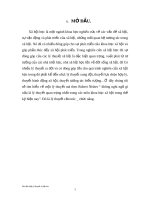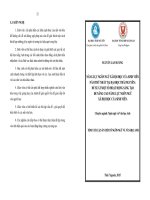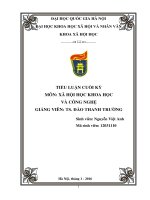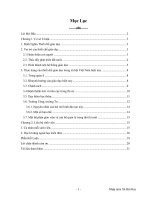TIỂU LUẬN NGÔN NGỮ XÃ HỘI HỌC
Bạn đang xem bản rút gọn của tài liệu. Xem và tải ngay bản đầy đủ của tài liệu tại đây (151.49 KB, 10 trang )
HUE UNIVERSITY
INSTITUTE OF OPEN EDUCATION
AND INFORMATION TECHNOLOGY
ENGLISH LANGUAGE
SOCIOLINGUISTIC PROJECT
Lecturer: TS. Trần Thuần
Student’s name:Ngô Thị Ngọc Ánh
Student’s code: 7052900513
Class: Nghe An 6
Topic 10:
How do you address each other in your culture? Does the form of
address depend in any way on factors (variables) such as that
person’s gender, age, ethnicity, dress, perceived role, physical wellbeing, or behavior? Compare the addressing patterns of people in
your culture with English people or with the people you are familiar
with.
Nghe An, July 2023
I. INTRODUCTION
Language is an inevitable product of the communication process in order to
satisfy one of the essential needs to ensure the existence and development of
human society. In any language, the issue of address is very important and is
considered as the premise of communication. If the address is incorrect, it means
that the relationship between the communicators is incorrectly defined, making the
conversation difficult. For the Vietnamese people, due to the influence of feudal
rites, with the binding of the ideology of “tam cương, ngũ thường” it has
profoundly influenced the psychological and emotional life of each member of
Vietnamese society. throughout generations. Therefore, the system of pronouns in
Vietnamese, the choice of pronouns in Vietnamese communication depends on
many factors, with human meanings and profound cultural connotations.
Addressing is also a psychosocial issue in communication that is concerned by the
vast majority of members of society, and considers it as a very necessary principle
of conduct in social relationships. Among the cultural factors, the way to behave
when communicating in society, which stands out as the problem of choosing how
to address to satisfy the purpose of communication, is a matter of profound human
significance.
This article shows that the way of addressing in Vietnamese culture depends
on many factors such as gender, age, ethnicity, etc. and culture of that nation. In
Vietnamese, the way of addressing is very rich and complex. In contrast, the
British way of addressing is simpler and it has some similarities as well as many
differences with Vietnamese people.
Thus, the way of addressing speaks to the socio-cultural context
characteristics of each language, which should be studied by combining culture and
language.
II. CONTENT
In Vietnamese, addressing is very important in communication
relationships. Vocabulary words in Vietnamese have very clear expressive nuances
such as: respect, intimacy, casualness, contempt... The choice or change of address
words depends on the level of affection between the parties involved.
communicate. In certain contexts, combined with intonation factors, one can
determine the semantics of address words. Through addressing, it is possible to
convey to listeners feelings of joy, sadness, love, hate... It can be seen that
Vietnamese people attach great importance to hierarchies, delicate emotional life.
At the same time, it is also through the name to see the typical cultural features of
the Vietnamese nation. Addressing is also considered an art in communication.
Because legitimate personal pronouns in Vietnamese are limited in number
and scope of use, but thanks to the system of temporary kinship nouns used in the
address function, the system of pronouns Vietnamese language becomes very rich.
As a result, the address in Vietnamese also has distinct expressive nuances,
distinguishing hierarchy, gender, age, ethnicity ... Responding to a type of address
denotes a different relationship, nuances of expression Feelings are also different.
It is this that makes the address in Vietnamese have rich connotations.
Classification of pronouns in Vietnamese
In Vietnamese, linguists such as Nguyen Kim Than (1963), Le Can, Cu Dinh
Tu, Hoang Tue (1962), Diep Quang Ban and Hoang Van Thung (1998) also
classified Vietnamese pronouns into groups: address with proper personal
pronouns, address with kinship nouns, in addition, address with nouns indicating
position, occupation, address by full name...
Addressing with proper personal pronouns:
In Vietnamese, proper personal pronouns in both singular and plural are
limited in number. The expressive nuances of these address words are often casual,
not polite, except for the pronoun "I" which is neutral. Therefore, these terms are
used only in a narrow range. For example: In Vietnamese, when self-professing at
the equal shoulder and the lower shoulder, it denotes a casual, intimate, and polite
tone of voice, etc., usually three personal pronouns are used: "“tôi, tao, tớ”.".
Corresponding to it, when self-proclaimed on the upper shoulder, use nouns
to address kinship in cases showing the meaning of respect and politeness ...
"grandfather, grandmother, father, mother, uncle, brother, aunt, uncle … When
self-advocate on the lower shoulder, showing a humble tone often uses kinship
nouns such as " em, con, cháu..”.."
Due to the limited semantics of legitimate personal pronouns, the
Vietnamese language mainly uses nouns indicating kinship relations, which are
temporarily used in the addressing function, occupying an important position in
terms of quantity. Frequency of use and especially pragmatic meanings are diverse
and flexible.
Cultural connotations of Vietnamese pronouns
In the communication of Vietnamese people, corresponding to a way of
addressing is expressing a different relationship, the level of affection is also
different. In Vietnamese, legitimate personal pronouns in all three persons are used
in a narrow range, only in the equal relationship of age, social status, or only used
to address groups of people with different geographical positions. inferior taste.
Therefore, legitimate personal pronouns are often used when expressing casual,
contemptuous, angry tone, sometimes also used to address intimacy in friendship
relationships. For example, the first person singular pronoun "I" refers to himself in
communication with strangers, in a polite manner, or when he reports or speaks in
front of a large number of people. Superiors address subordinates, address between
heads and employees in the agency, or address between people of equal age. This
type of address is often used in heterosexual relationships. In addition to showing
humility, sometimes the pronoun "we" is used instead of the pronoun "I". (Usually
used to address oneself formally in front of a large number of people).
The change in the way of addressing in Vietnamese also indicates expressive
nuances (only relationship gets better or worse). For example: In an intimate
relationship, "I" is used to indicate coldness and anger. In the relationship between
husband and wife, addressing by "I" indicates sulking and anger. In the relationship
between parents and children, when a father or mother calls "I" to their children, it
often carries an angry and dissatisfied tone. In contrast, in the family, children do
not address "I" to grandparents and parents. In social communication, young
people do not address "I" to the elderly, there are a few localities where children
habitually still address "I" to their parents and grandparents. In the case of selfproclaimed "tao", "I" and addressing the co-conversation as "mày" and "mi", this
way of addressing is only used to address intimacy between friends, or to address
younger people, signifying friendly tone, sometimes indicating anger.
In Vietnamese, the specific meanings of pronouns for speaker and listener
change depending on each communication situation. The self-proclaimed 'I', the
person who is called 'grandfather, brother, sister, brother, child, grandchildren...' in
the sentence will have a role change, the ethnic nouns are pronounized and used
flexibly, synonymously time can be concurrently in all three places, the first person
(as the speaker), the second person (the role of the listener) and the third person
(the role of the person being talked about). This multi-person phenomenon is only
in the words of kinship. To address the third person singular is often combined
with nouns indicating the person who creates isotope phrases, making it easier for
listeners to distinguish the mentioned object, the phenomenon of creating isotope
idioms does not exist the function of discriminating but only the function of
describing the speech. For example: pronouns: ‘ông ấy, bà ấy, anh ấy, chị ấy, cô
ấy…” Indefinite case use “hắn” “y” “gã” “thị” in case of small person address I'm
older than I use "it".
Due to the fact that there are very few personal pronouns in Vietnamese,
and they do not have polite nuances (except for the first person personal pronoun
"I"), a provisional kinship noun system is used in Vietnamese make pronouns. It is
thanks to this feature that Vietnamese people can only distinguish, through the way
they address themselves, whether the relationship between them is a relative or a
sister, a blood relationship or a non-blood relationship. Expressive nuances
between the parties involved in the dialogue are: happy, sad, angry, angry, polite,
friendly, unfamiliar...
Similarities and differences between the address culture of Vietnamese and
British people.
1. Similarities:
Respect: Both Vietnamese and British cultures emphasize showing respect when
addressing others. This respect is usually displayed through the use of appropriate
titles or honorifics.
Formality: In both Vietnam and Britain, there is a general expectation of
maintaining formalities when addressing people in professional or formal settings.
This includes using appropriate prefixes or titles, such as Mr., Mrs., Ms., or Dr.
Politeness: Both Vietnamese and British cultures place importance on polite and
courteous language. This includes using polite forms of address, such as "please"
and "thank you."
2. Differences:
The Vietnammese have a more complex system of addressing than the
British. In Vietnammese, there are many different pronouns depending on the
relationship and age of the speaker. For example, young people often address “em”
to older people, while older people often address “anh, chị” to younger people.
Meanwhile, British people usually only use “you” to address whith people.
Name order: In Vietnam, the family name comes before the given name, while in
Britain, the given name comes before the family name. For example, in Vietnam,
Nguyen Van A is addressed as Mr. Nguyen, while in Britain, John Smith is
addressed as Mr. Smith.
Formality levels: Vietnamese address culture has a more complex system of
honorifics and formalities compared to British culture. In Vietnam, the appropriate
title and level of formality can vary based on age, social status, and relationships.
Informal address: In British culture, it is more common to use informal address
forms among friends, colleagues, and sometimes even in professional settings.
Vietnamese culture, on the other hand, generally maintains a higher level of
formality.
In Vietnamese culture, addressing patterns tend to include a strong emphasis
on hierarchy and age. Respect and deference towards elders is highly valued, so
younger individuals often address their elders with specific titles or honorifics. For
example, children might address their parents as "ba" (father) or "mẹ" (mother),
while younger siblings may refer to older siblings as "anh" (older brother) or "chị"
(older sister). Similarly, employees may address their superiors by their
professional titles, such as "giám đốc" (director) or "thầy" (teacher).
In English culture, the addressing patterns are generally more informal and
egalitarian. Relationships are often based on familiarity rather than hierarchy, and
first names are commonly used to address both friends and family members. This
applies across generations, so children may call their parents by their first names as
a sign of familiarity and informality. In professional settings, individuals usually
address their colleagues and superiors by their last names, such as "Mr. Smith" or
"Dr. Johnson."
It is important to note that addressing patterns can vary within each culture
depending on factors such as regional differences, personal relationships, and
individual preferences.
People who work as teachers in Vietnam are allowed to be "teachers", which
is different from the way people address other people of the same age. This reflects
the Vietnamese tradition of "respecting the teacher and respecting the way". Even a
teacher's spouse is called a teacher even though they are not teachers.
In English culture, the way to address teachers is the same as for other
professions. Their calling does not depend on their level of education but on their
marital status.
Unmarried female teachers are called “Miss”, whether young or old. For
men, everything is "Mr", regardless of whether the person is married or not. Only
those who hold a doctorate or are a doctor are called otherwise. That's why the
teaching profession is really special in Vietnam.
The use of family names for the whole society shows the solidarity of
Vietnamese people, and also shows the openness in welcoming outsiders into their
community. This makes the whole society closely bonded like a family.
III. CONCLUSION
In the trend of globalization integration, people are not limited to family and
village relationships. Communication is expanding more and more when people
have higher needs to exchange not only within the country but also with friends
from all over the world.
Addressing is not just a matter of language, it is also a cultural factor, an
important part of communication.
In Vietnamese, because legitimate personal pronouns have limitations in
terms of expressive nuances, most of the Vietnamese address people using kinship
nouns. It is this factor that has made the system of Vietnamese pronouns rich, it
can describe the hierarchical and kinship relationships in the family and in the
society of Vietnamese people. The choice of address words to suit the
communication roles is based on the principle of modesty, respect, politeness,
courtesy to the co-conversation, humility and courtesy towards oneself. That is the
culture with bold colors of the Vietnamese nation.
Compared to English, it can be said that Vietnamese has a much richer
system of personal pronouns in both quantity and variety in usage. Vietnamese
often uses words that refer to kinship relationships that English cannot find
equivalent words. In addition, due to cultural differences, the system of personal
pronouns as well as the use of pronouns in English and Vietnamese also have many
differences. Cultural factors and social norms also require each language to have
an appropriate system of personal pronouns.
Regardless of the language, whether it's English or Vietnamese, when
communicating, each individual should choose and adjust the way they address the
subject as well as the communication situation and especially the changing
emotions. The way we address it has also changed. Cultural factors as well as
family, social and emotional relationships are the cause of the different ways of
addressing the two languages.
REFERENCES
1. Duong Thi Nu (2003), Semantics of groups of words indicating kinship
relations in English and Vietnamese, Doctoral Thesis in Literature, Institute of
Linguistics.
2. Nguyen Van Chien (1993), Vocabulary in Vietnamese, Journal of
Linguistic and Cultural Issues, Hanoi National University of Education.
3. Nguyen Van Tu (1996), On how to address in state agencies, mass
organizations, school, junior high school (1), – 11.
4. Nguyen Thi Tuyet Thanh, (2007), Semantics and grammar of Chinese
pronouns compared with the equivalent class of words in Vietnamese, PhD thesis
in Literature, University of Social Sciences and Humanities, VNU-HCM. HCM.
5. Nguyen Nhu Y (1990), Social role and language behavior in
communication, TCN 3.
6. Truong Thi Diem (2002), Vocabulary derived from kinship nouns in
Vietnamese communication. Doctoral Thesis in Linguistics. University of Social
Sciences and Humanities, Vietnam National University, Ho Chi Minh City.









